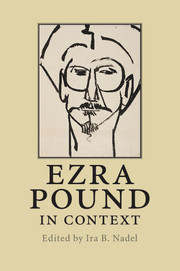Book contents
- Frontmatter
- Contents
- Notes on contributors
- Acknowledgements
- Chronology
- List of abbreviations and note on references to The Cantos
- Introduction
- Part I Biography and works
- Part II Historical and cultural context
- 16 The classics
- 17 Provençal and the troubadours
- 18 Dante and early Italian poetry
- 19 America
- 20 Venice
- 21 London
- 22 Paris
- 23 Rapallo and Rome
- 24 Pisa
- 25 Imagism
- 26 Vorticism
- 27 Music
- 28 Visual arts
- 29 Confucius
- 30 The Orient
- 31 Little magazines
- 32 Publishing and publishers
- 33 Modernism
- 34 Fascism
- 35 Anti-Semitism
- 36 Gender and sexuality
- 37 Race
- 38 Travel
- Part III Critical reception
- Further reading
- Index
- References
16 - The classics
Published online by Cambridge University Press: 05 July 2014
- Frontmatter
- Contents
- Notes on contributors
- Acknowledgements
- Chronology
- List of abbreviations and note on references to The Cantos
- Introduction
- Part I Biography and works
- Part II Historical and cultural context
- 16 The classics
- 17 Provençal and the troubadours
- 18 Dante and early Italian poetry
- 19 America
- 20 Venice
- 21 London
- 22 Paris
- 23 Rapallo and Rome
- 24 Pisa
- 25 Imagism
- 26 Vorticism
- 27 Music
- 28 Visual arts
- 29 Confucius
- 30 The Orient
- 31 Little magazines
- 32 Publishing and publishers
- 33 Modernism
- 34 Fascism
- 35 Anti-Semitism
- 36 Gender and sexuality
- 37 Race
- 38 Travel
- Part III Critical reception
- Further reading
- Index
- References
Summary
POUND'S CLASSICAL EDUCATION
Ezra Pound was twelve when in 1897 he enrolled in the Cheltenham Military Academy near Wyncote, where he was given a solid grounding in English, Latin, Greek, history, and mathematics. We find a reference to the classical curriculum in a letter to his parents in June 1898, when he writes about his forthcoming holiday: “no more Latin, no more Greek / no more smoking on the sneak” – the conventional outburst of joy of the schoolboy who is (temporarily) freed of the tedium of many hours spent in learning grammar. At the Academy, both Greek and Latin were taught by Frederick James Doolittle, known among the cadets as “Cassius” because of his lean and hungry appearance. Pound later recalled in Guide to Kulchur that a man called Spenser recited a long passage from the Iliad to him, which “was worth more than grammar when one was 13 years old” (GK, 145), while in Canto lxxx/532 we read that “old Spencer (,H.)…first declaimed me the Odyssey.” However, J. J. Wilhelm has shown that no existing bulletins of the school mention him, while his name does not appear in the census rolls of Wyncote and vicinity.
When Pound looked back on his school years in “Early Translators of Homer” (1918), he observed that he probably was not “the sole creature who has been well taught his Latin and very ill-taught his Greek” (LE, 249). The subsequent critical assumption that Pound was reasonably competent in Latin, but that his mastery of Greek was far from flawless, may have been strengthened by his own occasional overstated observations on the learning of the classics: “Really one don't need to know a language. One needs, damn well needs, to know the few hundred words in the few really good poems that any language has in it. It is better to know [Sappho's] poikilothron by heart than to be able to read Thucydides without trouble” (SL, 93).
- Type
- Chapter
- Information
- Ezra Pound in Context , pp. 171 - 180Publisher: Cambridge University PressPrint publication year: 2010
References
- 2
- Cited by

